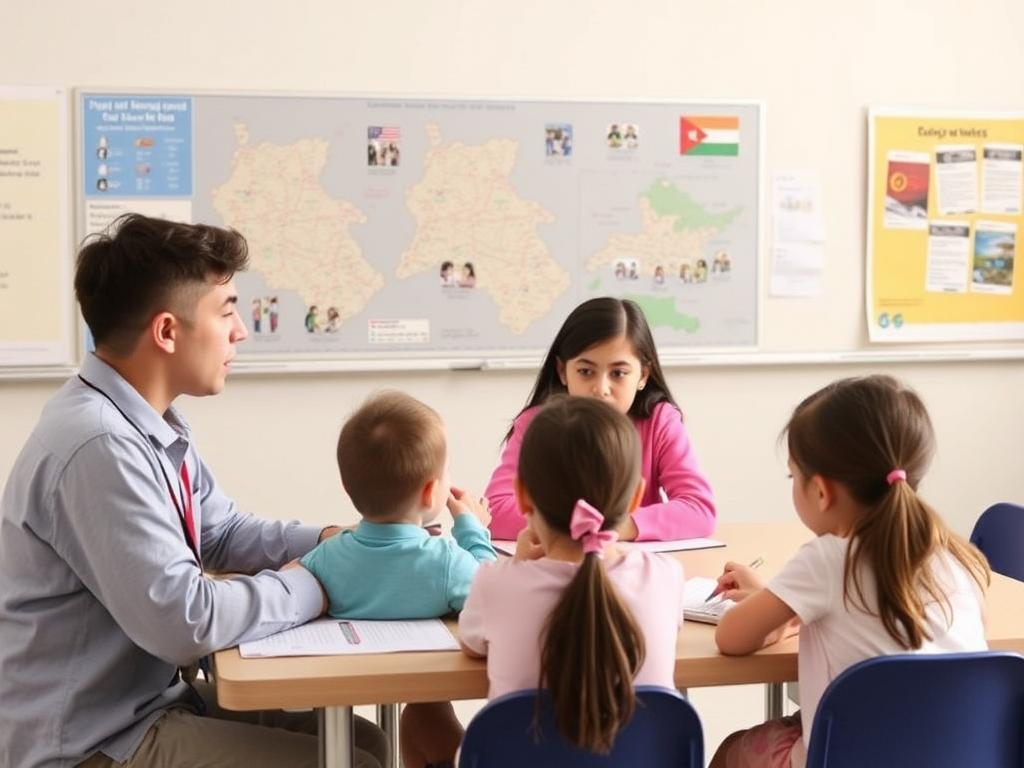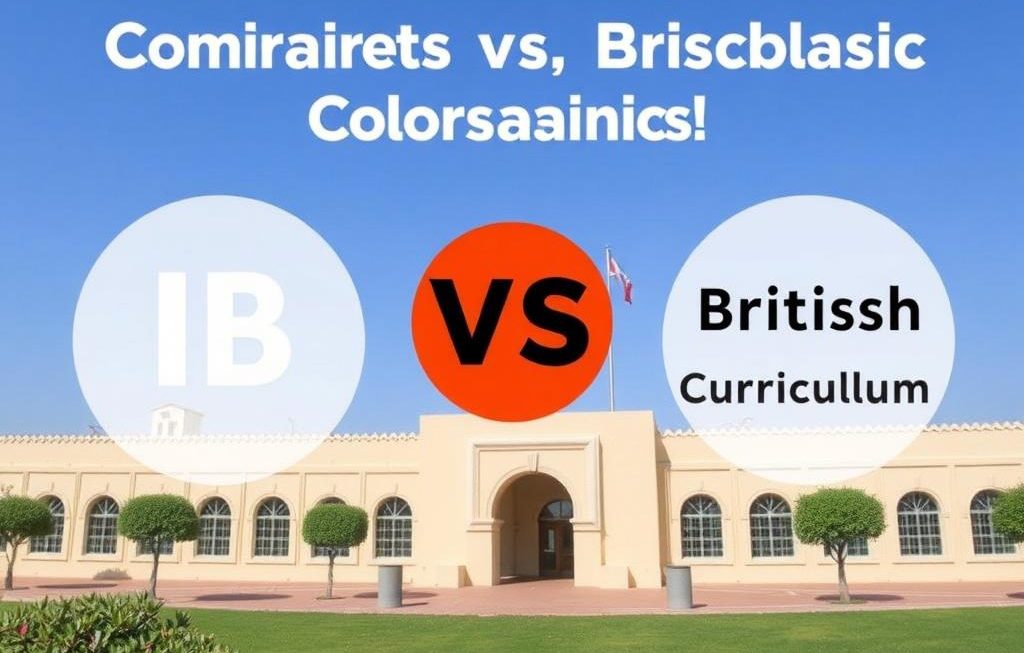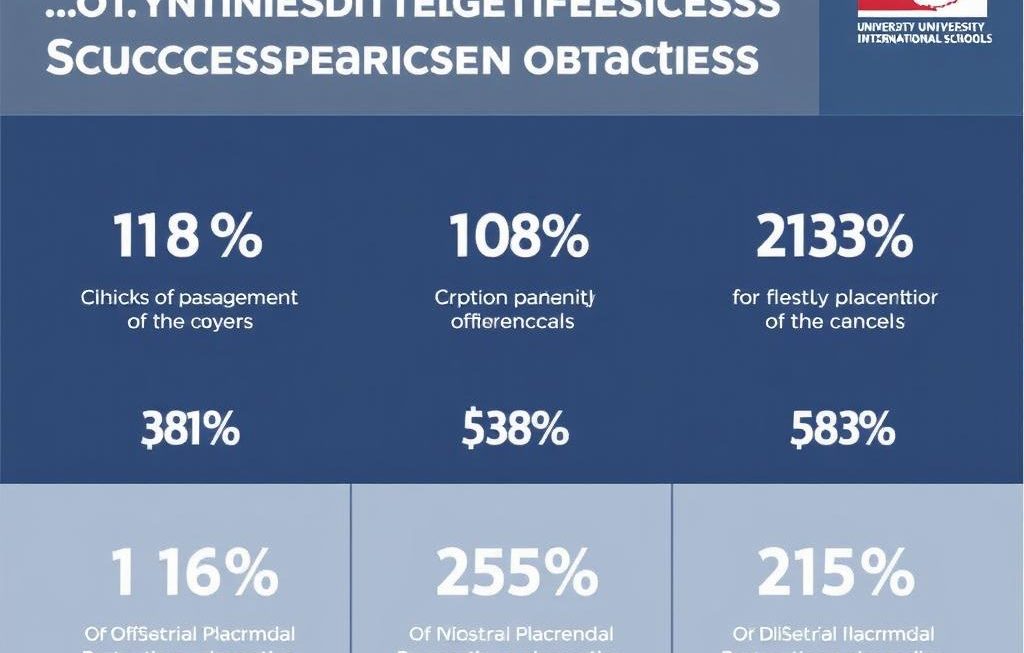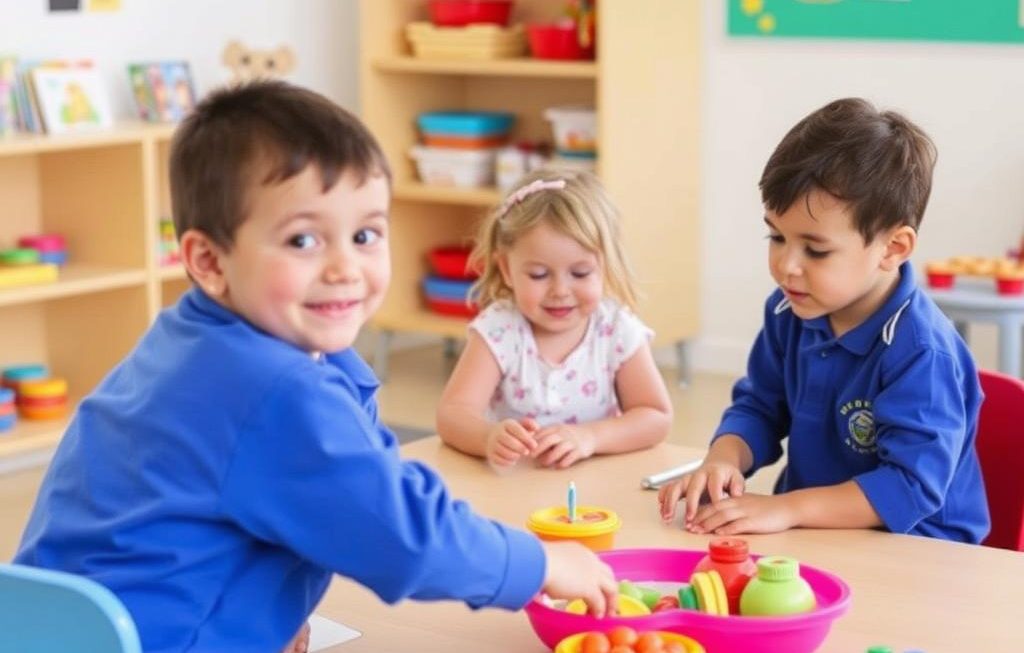Language immersion schools Cyprus represent a growing educational trend that aims to equip students with comprehensive bilingual or multilingual proficiencies by surrounding them with the target language both in and outside the classroom. This approach has gained traction in Cyprus’s international school landscape, particularly because of the island’s unique position at the crossroads between Europe, the Middle East, and North Africa. With a diverse population of locals, expatriates, and international communities, bilingual education Cyprus international schools offer is essential in meeting the needs of families and students who want to thrive in an increasingly globalized world.
The following article provides an in-depth analysis of language immersion programs operating within Cyprus international schools. It explores the structure and characteristics of dual language curriculum Cyprus institutions, the advantages and potential drawbacks of immersion education, and particular considerations for expat kids language learning Cyprus settings. The discussion also ventures into socioeconomic implications, pedagogical approaches, and cultural integration to create a comprehensive picture of this significant educational phenomenon.
Understanding Language Immersion Schools Cyprus
Language immersion schools in Cyprus are designed to provide students with a learning environment where a substantial portion of instruction is conducted in a second language, alongside or instead of their native tongue. These schools can be partially or fully immersive: partial immersion might involve teaching certain subjects in the target language, while full immersion uses the target language for most academic content. The goal is not merely to teach a language as a subject but to develop fluency through consistent and meaningful use.
Cyprus international schools offering immersion programs often blend local and foreign curricula. Many follow internationally recognized standards, such as the International Baccalaureate (IB) or British GCSE/A-Level frameworks, adapted to include a strong emphasis on bilingual education. For example, a dual language curriculum Cyprus school might teach mathematics, science, and social studies primarily in English while ensuring Greek or another language is used extensively in arts, physical education, and language arts.
This model encourages students to function naturally in both languages within and beyond academic settings. The linguistic environment reflects authentic usage rather than rote memorization, fostering higher levels of communicative competence. As a result, students graduate not only with academic knowledge but also with a valuable skill set that enhances their career and social prospects.
Language immersion schools in Cyprus aim to create fluent bilingual individuals by integrating target languages into all aspects of daily learning, far beyond traditional language classes.
The Structure of Dual Language Curriculum Cyprus Programs
A dual language curriculum Cyprus international schools use is distinct from standard language instruction. This curriculum ensures that students receive equitable educational content in two languages. The balance of language use varies by school and age group: some have a 50-50 split while others might lean more heavily on one language in early grades, gradually introducing balance in later years.
Typically, in the early stages of schooling, subjects that require foundational skills such as reading and writing are taught heavily in the primary or native language. This avoids premature cognitive overload. However, oral proficiency in the second language is heavily encouraged through group activities, immersion into natural language use, and phonics instruction. As students advance, academic subjects increasingly employ the second language.
A typical outline of teaching subjects in an immersive format might look like this:
| Grade Level | Language Usage | Subjects Taught in Target Language |
|---|---|---|
| Early Years (KG-2) | Primary language: 70%, Target language: 30% | Arts, Physical Education, Language Arts (target language) |
| Primary Years (3-5) | Primary: 50%, Target: 50% | Mathematics, Science, Social Studies (split progressively) |
| Middle and High School | Primary: 40%, Target: 60% | Most core subjects in target language |
This incremental exposure strategy aligns with cognitive development research, suggesting that bilingualism is best fostered through early and consistent context-driven learning rather than isolated instruction. In Cyprus, the languages most commonly immersed are English and Greek, followed by French, Spanish, or German depending on the school’s orientation and student demographics.
Dual language curricula balance subject instruction between two languages to ensure cognitive development and bilingual proficiency are nurtured uniformly.
Benefits of Bilingual Education Cyprus International Schools Offer
The proliferation of bilingual education in Cyprus international schools is underpinned by solid evidence demonstrating numerous benefits. These advantages span cognitive, cultural, academic, and socio-emotional domains, making language immersion programs an attractive offering for parents and educators alike.
First, children in language immersion schools develop advanced cognitive flexibility. Bilingualism enhances executive functions such as problem-solving, multitasking, and attentional control. Immersed students frequently outperform monolingual peers on tasks requiring mental switching and inhibition. This cognitive edge is significant in today’s competitive academic environments.
Academically, students in immersion programs tend to achieve high proficiency in both languages. This proficiency, in turn, improves opportunities for higher education domestically and internationally. For example, students fluent in English and Greek can access a broader range of universities across Europe, North America, and the Middle East. Bilingual proficiency also enhances employability, particularly in Cyprus’s growing service sectors like tourism, finance, and technology.
In cultural terms, bilingual education fosters an appreciation and understanding of multiple cultures. For expat kids language learning Cyprus offerings can be a bridge that connects them both to their heritage and their new community. This can ease social integration, reduce cultural isolation, and promote tolerance. Furthermore, students become lifelong learners open to global perspectives.
Psychologically, immersion schools build greater self-confidence and improved communication skills. Navigating different languages encourages empathy and social adaptability, key qualities for personal and professional success.
Bilingual education nurtures cognitive flexibility, academic advantages, and cultural empathy, preparing students for a complex globalized world.
Immersion Program Pros Cons Cyprus Parents Should Consider
Despite the many benefits, immersion program pros cons Cyprus schools face are crucial to analyze before enrolling children in such settings. While the advantages are compelling, challenges can affect students and families differently. Understanding both sides paints a realistic picture.
Among the pros, immersion programs offer:
- Superior language acquisition and fluency.
- Enhanced cognitive development as seen in various studies.
- Improved cultural awareness and cross-cultural skills.
- Greater academic opportunities and international mobility.
On the downside, immersion education presents:
- An initial period where students may lag behind monolingual peers academically due to language adjustment.
- Potential confusion or interference between languages, especially in young learners.
- Limited immersion program availability depending on locality or school resources.
- Challenges for parents who do not speak the immersion language, making home support difficult.
- Extra demands on teachers’ expertise and training.
The period of initial struggle is particularly noteworthy. Many students enrolling in immersion schools experience what is often called the “silent period,” during which they may not produce much of the target language while absorbing it. This can be worrisome for parents unfamiliar with immersion pedagogy. However, research confirms students often achieve — and surpass — grade-level standards once proficiency develops.
Additionally, immersion programs require specialized teachers proficient both in content and language instruction, which can strain school resources. Not all international schools in Cyprus can maintain this balance effectively, potentially compromising quality.
While immersion programs promise deep bilingual skills, initial adjustment challenges and resource demands can create barriers for some students and families.
How Expat Kids Language Learning Cyprus Challenges Differ
Expat kids language learning Cyprus contexts present distinct considerations compared to native children. International families choose Cyprus for its quality international schools but often arrive without fluency in Greek or other local languages. Language immersion schools serve as vital platforms to support integration and academic continuity for these children.
However, expatriate children often start with no proficiency in the immersion language, which can intensify the “language shock” effect. They may face social isolation, classroom participation difficulties, or delayed content comprehension. For these students, language acquisition programs require tailored support such as additional tutoring, peer mentorship, and specialized English as a Second Language (ESL) or Greek as a Second Language classes.
Parents from diverse linguistic backgrounds may struggle to assist with homework or communicate with teachers due to language barriers. This increases the need for schools to maintain clear communication and offer multilingual support services. Some Cyprus international schools adopt a hybrid approach, combining immersion with bilingual support classes to ease transitions for expat kids.
Cultural adjustment is another critical factor. Children not only grapple with the academic language demands but also adapting to local norms and peer dynamics. Schools that incorporate intercultural education and offer social integration programs create better outcomes for expat students.
Expat children face unique linguistic and cultural challenges in immersion schools, necessitating dedicated support for effective language acquisition and integration.
Pedagogical Approaches in Cyprus International Language Immersion Schools
The success of language immersion schools Cyprus depends heavily on the pedagogical approaches they adopt. Effective immersion instruction goes beyond simple language classes; it integrates language and content instruction holistically.
Many Cyprus international schools implement Content and Language Integrated Learning (CLIL) frameworks. CLIL involves teaching academic subjects through a second language, simultaneously advancing language proficiency and subject mastery. This dual-focused pedagogy stimulates meaningful language use and deeper cognitive engagement.
Teaching strategies include scaffolded language development, where instructional support gradually diminishes as students gain proficiency. Visual aids, graphic organizers, and cooperative learning techniques enhance comprehension without overwhelming language learners. Formative assessments are regularly conducted to monitor both academic progress and language development.
Teachers in immersion schools are often bilingual themselves, fluent in the target and native languages, and receive specialized training in second language acquisition methodologies. Continuous professional development helps maintain instructional quality and adapt to diverse student needs.
Moreover, technology integration plays a growing role. Language learning apps, interactive digital resources, and virtual exchange programs enable immersive experiences beyond the classroom walls. Cyprus’s international schools increasingly leverage such tools to supplement traditional methods.
Pedagogical success in immersion depends on integrating language and content instruction using research-backed strategies such as CLIL and scaffolded learning.
Socioeconomic and Cultural Implications of Language Immersion Programs in Cyprus
Language immersion programs also influence broader socioeconomic and cultural dynamics within Cyprus. The island’s diverse demographics create both opportunities and challenges for language education policy and practice.
From a socioeconomic perspective, immersion schools often attract families with higher resources or international mobility, raising questions around accessibility and equity. Tuition fees at many Cyprus international schools offering bilingual curricula are prohibitive for average-income families. This creates disparities in who benefits from advanced language education.
On the cultural front, immersion programs serve as conduits for intercultural dialogue and community cohesion. Bilingual classrooms bring together students from different linguistic and cultural backgrounds, fostering mutual understanding. Especially in multiethnic Cyprus, where Greek, Turkish, Armenian, and expatriate communities coexist, such schools promote social integration.
However, immersion education can also provoke debates around language dominance and identity. For instance, emphasis on English-language immersion sometimes prompts concerns about marginalizing the Greek language and heritage. Schools must balance globalization realities with local cultural preservation.
Government initiatives and NGO programs increasingly seek to support expanded access to language immersion, recognizing its economic and diplomatic importance. Public-private partnerships and scholarship schemes aim to widen participation and ensure the benefits of bilingual education are broadly distributed.
Bilingual education in Cyprus intersects with issues of equity, cultural identity, and social cohesion, highlighting the need for inclusive, balanced policies.
Your Next Step in Bilingual Mastery: Weighing the Benefits and Challenges Thoughtfully
Language immersion programs in Cyprus international schools embody an exciting yet complex educational model. These schools blend rich curricula designed to foster bilingual fluency, cognitive development, and cultural sensitivity. Their dual language curriculum Cyprus institutions create spans rigorous academic content delivered in two languages, promising to prepare students effectively for a globalized future.
However, prospective families must consider immersion program pros cons Cyprus realities do not always appear equally favorable. Initial language adjustment hurdles, resource demands, and cultural integration challenges can shape experiences differently. Expat kids language learning Cyprus challenges are particularly pronounced and require schools to provide tailored support and engagement.
Despite these challenges, the long-term benefits of immersion remain compelling: superior language skills, better cognitive function, access to international opportunities, and enhanced cross-cultural competencies. Thoughtful school selection, realistic expectations, and active parental involvement can help maximize advantages for students.
Cyprus, as a unique crossroads of cultures and languages, offers a fertile ground for language immersion schools to thrive. With well-structured programs and comprehensive support, these schools can play a pivotal role in shaping the next generation of bilingual and bicultural global citizens, fully equipped to navigate and contribute to an interconnected world.
Choosing language immersion education in Cyprus is a strategic decision balancing challenges with the promise of deep, lifelong bilingual skills and global opportunities.
Frequently Asked Questions (FAQs)
1. What languages are commonly offered in immersion programs in Cyprus international schools?
English and Greek are the most common, with some schools also offering French, German, or Spanish depending on their curriculum and student demographics.
2. How do dual language curricula in Cyprus differ from traditional language classes?
Dual language curricula teach academic subjects through two languages rather than offering language as a separate subject, promoting fluency through content integration.
3. What challenges do expat kids face in language immersion schools in Cyprus?
They often start with no proficiency in the immersion language, leading to initial adjustment difficulties, social integration issues, and a need for additional language support.
4. Are immersion programs in Cyprus suitable for all students?
While beneficial for many, some students may struggle initially due to language barriers. Program suitability depends on the child’s needs, parental support, and school resources.
5. How do immersion programs impact cognitive development?
Bilingual immersion enhances executive functions such as problem-solving, multitasking, and attention, offering cognitive advantages compared to monolingual peers.
6. Is parental involvement required for successful language immersion education?
Yes, parental support, especially in reinforcing language use at home and communicating with schools, is essential to maximize student success.
7. Do immersion schools in Cyprus offer support for families who don’t speak the immersion language?
Many schools provide multilingual communication, tutoring, and cultural integration programs, particularly aimed at supporting expat families.



